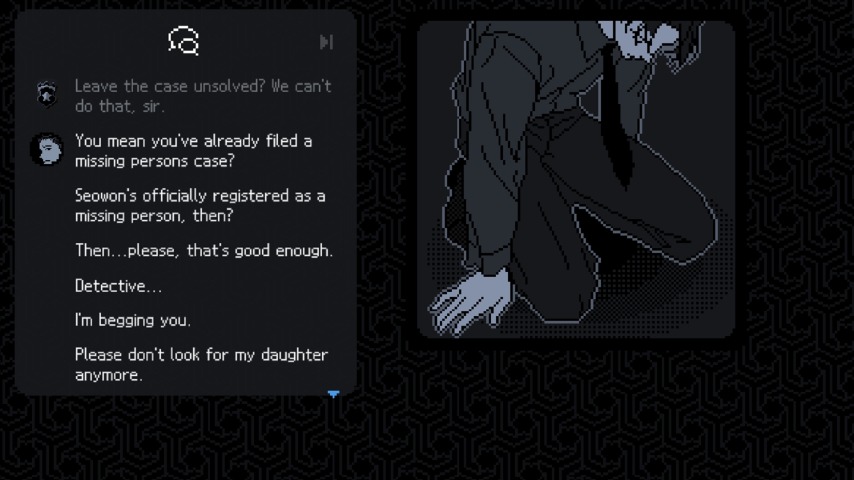We’re in a busy moment right now for big, attention-sucking video games, what with Monster Hunter: Wilds sitting on my PlayStation 5 right now, daring me to grind out a few more Tempered Arkveld kills so that I can craft myself a slightly shinier hat, or Avowed threatening me with the good time of figuring out how to build out the Wizard class tree in ways that’ll stop me from getting two-shotted by hordes of awful little spiders. (That’s to say nothing of having just gotten through the aggressively loud co-op rollercoaster of Split Fiction, a game that rarely says anything at a regular volume when it could shout it, with fireworks, instead.) What’s a gaming brain to do when it’s facing this kind of high-volume overstimulation? If you answered, “Find a low-key, contemplative detective game I missed when it came out back in 2024, and spend one whole night playing the hell out of it,” you’re clearly on this column’s wavelength.
The game in question: No Case Should Remain Unsolved, released in January 2024 by South Korean developer Somi. Taking place in the mind of a retired police detective trying to rebuild her memories of an old cold case, the game is somber, thoughtful, and as peaceful as you might expect this sort of mental woolgathering to be. Less rigorous than a more structured mystery like The Roottrees Are Dead, No Case still operates in the widening genre I’ve come to think of as “reading comprehension games,” those titles that simulate detective work less through overt puzzles—although it has a few of those—than in the player’s own understanding of a story. In this case, that means taking testimonies related to the kidnapping of a young girl, placing them in the proper order in your protagonist’s fractured mind, and (most critically) assigning the correct speaker to each bit of dialogue. As you bounce between different conversational prompts, the game occasionally takes on the feeling of more free-form games like Her Story or Immortality, as you can experience the plot in multiple orders depending on which threads you tug at—that sensation of stumbling into some huge, perception-shattering reveal, and then having to work out how it connects to what you’ve seen before, providing much of the game’s emotional heft.
“Gameplay”—i.e., the bits where you’re pushing buttons, rather than the more pure detective work of thinking through the story in the confines of your own mind—mostly involves navigating the web of dialogues to find points of connection. There are a few moments that play a bit more like the Phoenix Wright games, where you’re searching through previous conversations to find the answer to a question posed elsewhere, or to highlight a contradiction in someone’s testimony. (And a few more quiz-like elements when you’re asked to provide specific dates.) But for the most part, all of the serious work is fizzling along inside your brain, as new information forces you to re-contextualize a piece of dialogue you were sure came from one particular person, only to have your assumptions about the case get turned on their head. The mystery itself isn’t the most complex I’ve ever encountered, but in some ways, that plays to the game’s strengths: Often, the work you’re doing while playing is more about cluing into the sad or desperate feelings of the game’s characters, rather than cracking alibis or trying to find case-defining gotcha moments.
The whole thing made, at least in my action-scorched noggin, for a perfect antidote to recent explosions of excess. The worst thing about games like No Case Should Remain, honestly, is that you can only play them once, while games like Monster Hunter—which I’m enjoying, mind you, but in an increasingly exhausted way—are always ready to offer up one more hunt of a slightly different giant, fire-breathing chicken than the last six you murdered. There simply aren’t enough of these bespoke mysteries out there, so stumbling into a new one—especially one I missed when it was initially released—can be a calm panacea for my over-fevered gaming mind.









































